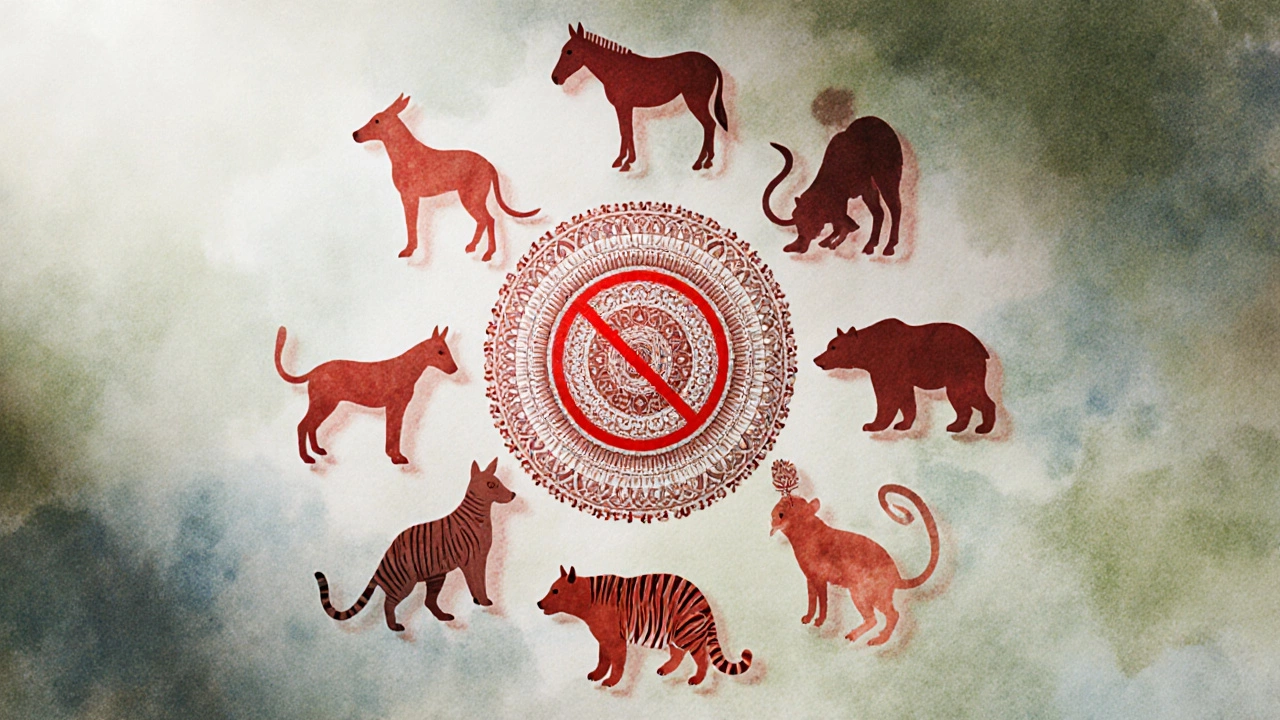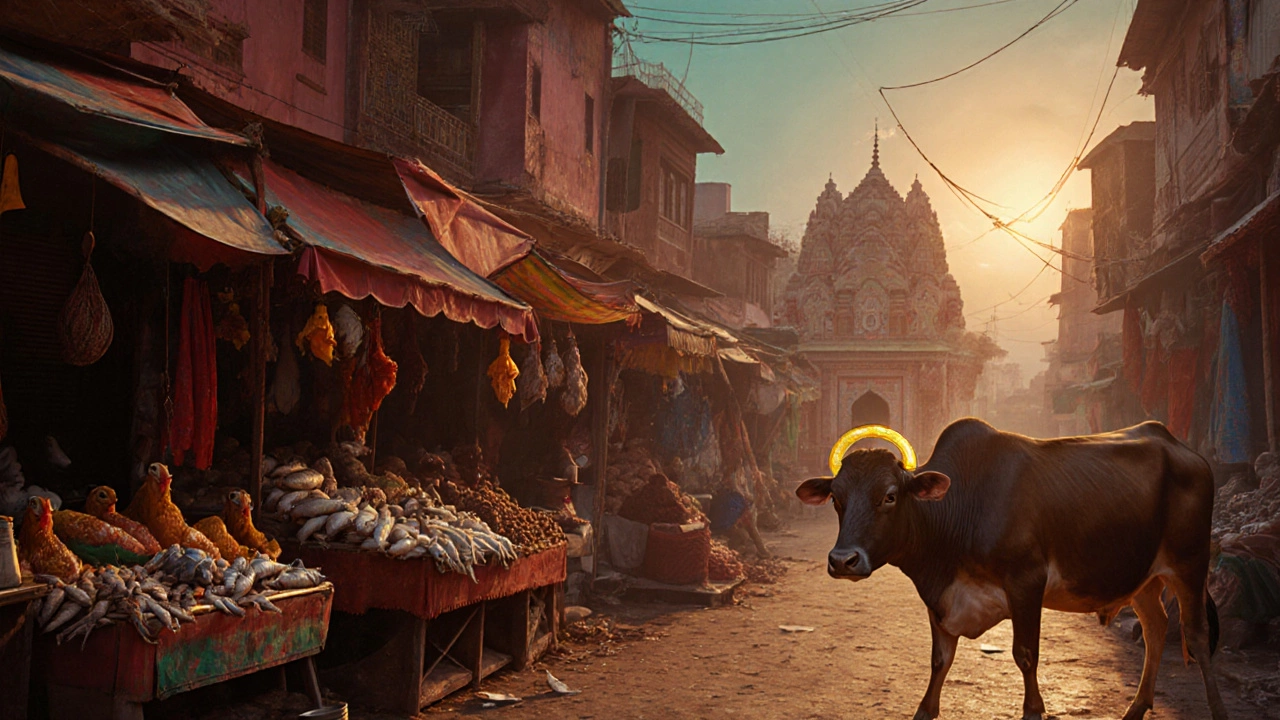Indian Meat Ban Checker
Enter a meat type and click "Check Legal Status" to see its legal status in India.
Ever wondered why you can’t find certain meats on Indian restaurant menus or at local markets? India’s meat regulations are shaped by a mix of religious traditions, wildlife protection, and state‑level legislation. This guide breaks down exactly which meats are off‑limits, why they’re banned, and what the law says if you cross the line.
Key Takeaways
- Beef from cows is prohibited in most states, while buffalo meat faces partial bans.
- Horse, dog, donkey, and cat meat are outright illegal nationwide.
- Wildlife meat such as tiger, leopard, pangolin, and bear is banned under the Wildlife Protection Act.
- Penalties range from fines to imprisonment, depending on the meat and the jurisdiction.
- Travelers and food entrepreneurs should check state‑specific rules before buying or serving meat.
Why India Regulates Meat
India’s approach to meat isn’t driven solely by health concerns. Two major forces shape the policy landscape:
- Religious reverence - For Hindus, cows are sacred; many states protect them through anti‑slaughter laws.
- Wildlife conservation - The Wildlife (Protection) Act of 1972 criminalises hunting or trading of protected species.
Both factors result in a patchwork of bans that can differ dramatically from one state to another.
Nationwide Banned Meats
Some meats are prohibited across the entire country, regardless of state legislation. Below are the primary examples, each introduced with structured data for easy indexing.
Beef refers to meat from cattle, which is protected under various state laws and, in practice, is unavailable for commercial sale in most of India.
Horse meat is illegal to sell, import, or consume under the Prevention of Cruelty to Animals Act.
Dog meat is expressly banned; cooking or trading it can lead to criminal charges.
Donkey meat falls under the same prohibition as horse meat, with severe penalties for violation.
Cat meat is illegal throughout India and is treated as animal cruelty.
Wildlife meat (including tiger, leopard, bear, pangolin, and other protected species) is prohibited by the Wildlife (Protection) Act, 1972.
State‑Specific Restrictions on Beef and Buffalo Meat
While the central government does not enforce a blanket beef ban, more than 20 states have enacted their own prohibitions. The table below gives a snapshot of the current situation as of 2025.
| Meat | Nationwide Status | States Where Banned | Primary Reason | Typical Penalty |
|---|---|---|---|---|
| Beef (cow) | Partial (state‑level) | Uttar Pradesh, Maharashtra, Gujarat, Karnataka, Tamil Nadu, Andhra Pradesh, Kerala, etc. | Religious protection & animal welfare | Fine up to ₹50,000; up to 3 years imprisonment |
| Buffalo meat | Partial (state‑level) | Gujarat, Karnataka, Tamil Nadu (certain districts) | Mixed cultural concerns | Fine up to ₹25,000; up to 2 years imprisonment |
| Horse meat | Nationwide | All states | Animal cruelty law | Fine up to ₹100,000; up to 5 years imprisonment |
| Dog meat | Nationwide | All states | Animal cruelty law | Fine up to ₹100,000; up to 5 years imprisonment |
| Donkey meat | Nationwide | All states | Animal cruelty law | Fine up to ₹100,000; up to 5 years imprisonment |
| Cat meat | Nationwide | All states | Animal cruelty law | Fine up to ₹100,000; up to 5 years imprisonment |
| Wildlife meat (tiger, bear, pangolin, etc.) | Nationwide | All states | Wildlife (Protection) Act, 1972 | Fine up to ₹10 Lakhs; up to 7 years imprisonment |

Legal Framework Behind the Bans
The most relevant statutes include:
- The Prevention of Cruelty to Animals Act (1960) - criminalises the slaughter, trade, or consumption of protected domestic animals like horses and dogs.
- The Wildlife (Protection) Act (1972) - lists prohibited species and details penalties for illegal hunting or trade.
- State Livestock Preservation Acts - each state may have its own act that defines which cattle can be slaughtered and under what conditions.
Where state law is stricter than national law, the stricter provision prevails. For example, even though buffalo meat is allowed in many parts of India, a state like Gujarat can ban it entirely.
How Violations Are Enforced
Enforcement agencies include the police, state animal husbandry departments, and the Wildlife Crime Control Bureau. Typical enforcement steps:
- Inspection of markets, slaughterhouses, and restaurants.
- Seizure of illegal meat, equipment, and documentation.
- Legal notice to the offender and filing of a criminal case.
- Court‑mandated penalties ranging from fines to custodial sentences.
Repeat offenders often face higher fines and longer prison terms. In 2023, a high‑profile case in Maharashtra saw the owner of a meat processing unit sentenced to three years for illegal beef trade.
Practical Tips for Travelers and Food Entrepreneurs
If you’re visiting India or planning to open a food outlet, keep these pointers in mind:
- Check the specific state’s animal welfare act before sourcing meat.
- Never purchase meat from informal street vendors without proper licensing.
- Maintain clear records of meat origin; certificates of slaughter are often required.
- For vegetarian or vegan establishments, clearly label all dishes to avoid accidental inclusion of prohibited meat.
- Stay updated with quarterly bulletins from the Ministry of Food Processing Industries, which often announce regulatory changes.
Common Misconceptions
Many people assume that all beef is illegal across India. In reality, states like Goa, Kerala (for certain cattle), and the Northeast allow regulated beef sales. However, the market is heavily segmented, and most mainstream chains avoid beef to sidestep legal complexities.
Another myth is that “exotic meat” is easy to import for gourmet purposes. The customs department treats exotic wildlife meat as contraband under the CITES agreement, and confiscations have risen by 12% annually since 2020.

What If You Accidentally Consume a Banned Meat?
For consumers, the law focuses on sellers and processors rather than the end‑user. That means accidental consumption typically does not result in criminal liability. However, you may face health risks if the meat was sourced illegally and did not meet safety standards.
Future Outlook
Debates continue about easing cow‑related bans to boost the meat export sector, especially in the wake of rising global demand for protein. Meanwhile, wildlife protection advocates push for stricter enforcement against poaching‑derived meat. Keep an eye on legislative sessions in New Delhi; any amendment could shift the legal landscape dramatically.
Bottom Line
If you’re navigating India’s food scene, knowing which meats are prohibited is crucial. From the nationwide bans on horse, dog, and wildlife meat to the state‑level patchwork surrounding beef, the rules are complex but manageable with the right research. Stay informed, respect local customs, and you’ll avoid costly legal troubles while enjoying India’s rich culinary heritage.
Frequently Asked Questions
Is beef completely illegal in India?
No. While many states ban cow slaughter, some states like Goa, Kerala (for certain cattle), and the Northeast allow regulated beef sales. The legality varies by state, so always check local laws before buying.
Can I import horse meat for a restaurant?
No. Horse meat is prohibited nationwide under the Prevention of Cruelty to Animals Act. Importing, selling, or serving it can lead to fines up to ₹100,000 and up to five years in prison.
What penalties apply for selling wildlife meat?
Violations of the Wildlife (Protection) Act can attract fines up to ₹10Lakhs and imprisonment ranging from three to seven years, depending on the species and severity.
Are there any exceptions for religious communities?
Some states allow meat from cows that are over a certain age or for specific religious rites, but these exemptions are narrow and heavily regulated. Always obtain proper documentation.
How can I verify if a meat supplier is legal?
Ask for a valid slaughter certificate issued by the state’s animal husbandry department and verify the license with the local Food Safety Authority. Keeping these records protects you from legal risk.
